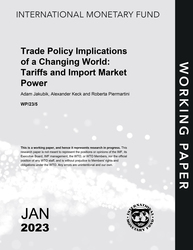
Trade Policy Implications of a Changing World: Tariffs and Import Market Power
Trade Policy Implications of a Changing World: Tariffs and Import Market Power
READ MORE...
Volume/Issue:
Volume 2023
Issue 005
Publication date: November 2022
ISBN: 9798400224324
$20.00
Add to Cart by clicking price of the language and format you'd like to purchase
Available Languages and Formats
| English |
Prices in red indicate formats that are not yet available but are forthcoming.
Topics covered in this book
This title contains information about the following subjects.
Click on a subject if you would like to see other titles with the same subjects.
Exports and Imports , Economics- Macroeconomics , Taxation - General , Economics / General , trade agreements , trade policy , terms of trade , import market power , WTO system , WTO member , tariff commitment , trade policy implication , WTO's negotiation function , Tariffs , Imports , Global
Summary
Economic theory suggests that countries’ tariff commitments in trade agreements reflect their import market power at the time of negotiations. However, as countries grow, their market power in different sectors can change in unforeseen ways and their commitments may no longer reflect changed economic conditions. Using a newly built dataset of pre-Uruguay Round applied tariffs and relying on the theoretical framework of the terms-of-trade motive for trade agreements, we estimate hypothetical tariff commitments under current levels of market power and compare them with actual tariff commitments. We find that lower tariff commitments required to reflect current economic conditions would amount to a reduction in annual tariff costs of up to $26.4 billion – equivalent to nearly 10% of global tariff costs. Our results reveal substantial heterogeneity between countries and sectors. The sectors with the largest potential tariff cost reductions are vehicles (HS 87) and machinery and appliances (HS 84-85). Product-level tariff reductions would range from 0 to 18.5 percentage points and are on average largest for China. In the past, the GATT/WTO system has updated tariff commitments through periodic rounds of negotiations, and our findings support the revival of the WTO's negotiation function in this area.
Copyright © 2010 - 2026
Powered by:
AIDC



